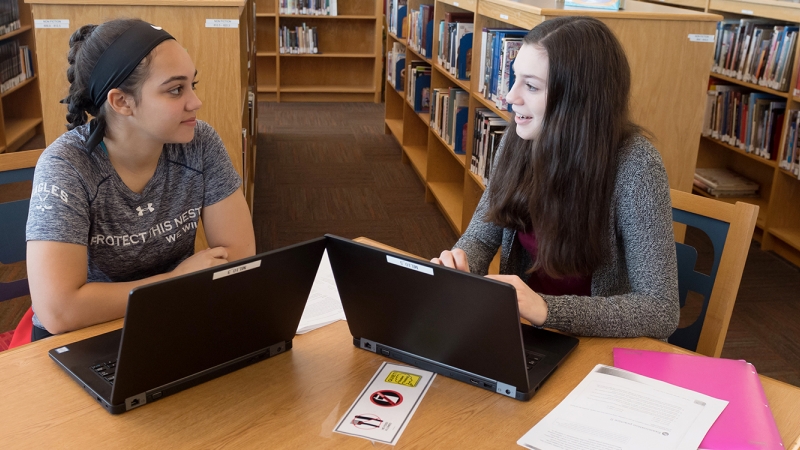Office of Research and Strategic Improvement's (ORSI) - Products and Services
Learn about the standards that guide ORSI's work and the reports issued by the office
The Office of Research and Strategic Improvement's (ORSI) work spans a wide range of activities from objective accountability reporting on FCPS instructional programs and services to screening all requests to conduct research and collect data within FCPS.
How We Do Our Work
The products and services provided by ORSI reflect professional standards established by the Joint Committee on Standards for Educational Evaluation (JCSEE), a coalition of major professional associations in the U.S. and Canada committed to promoting high quality research and evaluation. The JCSEE's standards cover five areas:
- Utility: The utility standards are intended to increase the extent to which program stakeholders find evaluation processes and products valuable in meeting their needs.
- Feasibility: The feasibility standards are intended to increase evaluation effectiveness and efficiency.
- Propriety: The propriety standards support what is proper, fair, legal, right, and just in evaluations.
- Accuracy: The accuracy standards are intended to increase the dependability and truthfulness of evaluation representations, propositions, and findings, especially those that support interpretations and judgments about quality.
- Evaluation Accountability: The evaluation accountability standards encourage adequate documentation of evaluations and a perspective focused on improvement and accountability for evaluation processes and products.
A more detailed explanation of these standards is available.
What We Offer
ORSI serves FCPS staff members, the School Board, and the community through research-based processes, tools, and evidence. Our reports include program evaluations, monitoring projects, and research studies that present evidence of division, school, and program impact and effectiveness. The selection of ORSI's projects is guided by their capacity to inform the Superintendent, Leadership Team, and School Board about FCPS’ goals and strategic initiatives. We also oversee FCPS’ Research Approval Process.
Evidence of FCPS’ Impact and Effectiveness
ORSI's projects and associated reports for the last three years are listed below in chronological order beginning with the most recently completed projects. Additional associated reports for these projects as well as reports for older projects can be requested directly from ORSI by calling 571-423-1430, by emailing [email protected], or by accessing reports posted in the ORSI Library on BoardDocs.
Analysis of FCPS Membership: Migration and Transfer from SY 2017-18 to SY 2021-22
As requested by the School Board, ORSI produced an Analysis of FCPS Membership, covering migration and transfer trends from SY 2017-18 to SY 2021-22. The Analysis of FCPS Membership: Migration and Transfer from 2017-18 to SY 2021-22, completed in January 2022, reviewed the trends in student membership, the magnitude of changes over the last five years, and factors influencing the observed trends.
Study of Teaching and Learning during the COVID-19 Pandemic
The Study of Teaching and Learning During the COVID-19 Pandemic was an investigation of instruction spanning the initial closing of schools in March 2020 to June 2021. The purpose of the study was to provide timely information to decision-makers about how well FCPS had designed and implemented instructional services and supports during the school closure years to meet students’ learning and wellness needs so improvements could be made. The study produced three evaluative reports. The final study report, Study of Teaching and Learning During the COVID Pandemic: Findings from SY 2020-21 to Inform Planning and Preparation for SY 2021-22 (September 2021), assesses the virtual learning that FCPS offered, as well as the impact FCPS’ virtual learning has on student academic and social-emotional outcomes with a focus on implications for SY 2021-22. The final report was preceded by two prior reports Study of Teaching and Learning During the COVID Pandemic: Findings from Fall/Winter SY 2020-21 (March 2021) and Distance Learning Study: Findings from Spring 2020 (July 2020). Both investigated FCPS’ virtual learning to inform beginning and midyear decisions during SY 2020-21. Additionally, given local and national concerns that students were not learning as well during virtual instruction, ORSI analyzed student marks, producing a separate report, Analysis of Q1 Secondary Marks, in December 2020. This report examines percentages of students not being successful, overall and by student groups in the first quarter of SY 2020-21 compared to the previous year. The marks report garnered national attention from the news media as FCPS was one of the first school districts in the United States to share student outcomes during virtual instruction.
Return to School Check-In Surveys
In SY 2020-21, ORSI regularly sent brief surveys to students, parents, and teachers to assess specific elements of teaching and learning. Reports describing the check-in survey data were released periodically with the final report covering all 11 survey administrations throughout the year. The final Check-In Surveys 1-11 Summary report summarizes each group’s perception of instructional quality, workload, screen time, and student well-being. The reports provided trend data so staff could identify areas of concern and track the results of improvement efforts.
Socioeconomic Factors Study
To support FCPS’ commitment to eliminating gaps in student achievement, ORSI analyzed five years of achievement data (SY 2013-14 thru SY 2017-18) to understand: (1) the extent school level enrollment of economically challenged students was associated with the capacity for FCPS schools to meet academic performance expectations; and (2) what was the typical impact on students of attending schools with higher levels of economically challenged students. The resulting report completed July 2019, provides information to aid leadership in decision-making about how best to manage higher levels of economically challenged students within the division and, potentially, to inform criteria for boundary-setting. This study was an update to the original study completed in 2013 that explored the extent to which a student’s individual poverty can be ameliorated to by enrollment in schools with low concentrations of poverty. The original 2013 paper describes how one factor, school poverty, was investigated to determine an empirically-based approach for giving all FCPS schools a better chance of attaining overall school success and to give all FCPS students a better chance of achieving individual success.
Student Behavior, Discipline, and Disproportionality
The Student Behavior, Discipline, and Disproportionality Study examined trends in discipline infractions, equity in discipline referrals and outcomes and the extent to which FCPS’ practices were aligned to research-based evidence of how to reduce discipline issues and disproportionality. The first report, Recommended use of FY19 Funds Set Aside for an Assistant Hearing Officer Position, completed in November 2018, examined trends in out-of-school suspensions, Hearings Office referrals, and disproportionality in discipline to inform decisions about resource allocation. The second report, Study of Student Behavior, Discipline, and Disproportionality: Study Design, described the design of a comprehensive review of discipline in FCPS including an ORSI study of student behavior, discipline and disproportionality as well as expert review of disproportionality/equity in discipline practices and intervention and prevention programs that promote positive student behavior and reduce discipline problems. The final report in the series, Student Behavior, Discipline, and Disproportionality, completed in June 2019, reported on trends in discipline infractions, consequences of infractions for students, disproportionality trends and where in the discipline process disproportionality was occurring, and recommendations to improve equity in discipline practices.
Research on Boundary Decision-making
Preliminary research by FCPS’ Department of Facilities and Transportation Services uncovered 16 factors that school districts across the country have used to make boundary decisions. This data was shared with the School Board who requested a follow-up study to include the examination of educational research around the 16 factors impacting boundary decisions. The Research on Boundary Decision Making, completed in January 2019, reviews the literature on how the factors used to make boundary decisions impact the achievement and social and emotional wellbeing of students.
Study of the Impact of Pre-Kindergarten Experiences
The Impact of Pre-Kindergarten Experiences study identifies whether differences exist in academic and behavioral outcomes among students with various types of preschool experiences as those students continue through the elementary grades and beyond in FCPS. The Final Report on the Study of the Impact of Pre-Kindergarten Experiences on FCPS Students, completed in May 2016, identifies differences that exist in academic and behavioral outcomes for students with and without a formal pre-kindergarten experience, and investigates the costs, funding streams, and potential return on investment of FCPS’ primary preschool offering (FECEP-Head Start).
Changes in Discipline Regulation and Practices Study
The Changes in Discipline Regulation and Practices investigation determines how the various changes FCPS had made to its discipline process over the last 12 years were associated with intended benefits to schools and students, and determined whether additional improvements might be implemented. In particular, the study examined connections among major discipline changes and related indicators of student behavior and academic achievement. The Final Study Report of Changes in Discipline Regulation and Practices, completed in April 2016, documents the changes to FCPS’ discipline practices, related impacts, and areas for continued improvement.
English Learner (EL) Study
The English Learner Study provides evidence-based judgments about the services provided by FCPS to its English Learner (EL) students at all grade levels, as well as the ESOL High School Pilot program begun in the 2015-16 school year (a program designed to serve the growing number of EL high school students with limited English skills). The study (a) identifies and classifies organizational structures and educational approaches supported by research for educating ELs in kindergarten through grade 12; (b) determines the extent to which FCPS' current structures and approaches reflect those found in the literature; (c) examines the performance of FCPS' ELs (English-language proficiency and academic performance in core content areas); (d) understands the relations among organizational structures, instructional approaches, and the performance of FCPS’ EL students; and (e) understands how FCPS uses funds for educating ELs. The English Learner Year One Report, released in January 2016, examines the quality of services for FCPS’ EL students in terms of the design of EL services and the outcomes (historical performance). The English Learner Year Two Report, EL Report addendum, and Program Management Response, completed in January 2017, addresses the areas listed above, including an analysis of the effectiveness of the ESOL High School Pilot program and costs for ESOL services.
Professional Development Study
In 2017, ORSI undertook a study to develop a set of standards for professional development that would support an organization in achieving its strategic aims. The Standards-based Study of FCPS’ Professional Development Year One Report, completed in October 2017, identified three sets of standards that must be addressed to leverage professional development toward organizational improvement: (a) cultural norms; (b) organizational infrastructure; and (c) PD experiences. The study examined the extent to which FCPS had a professional development system that was designed and implemented in alignment with the standards, met professional development outcomes (relevance, increased knowledge, change in behavior and organizational impact), as well as costs. The report provided actionable recommendations for improving the professional development system.



